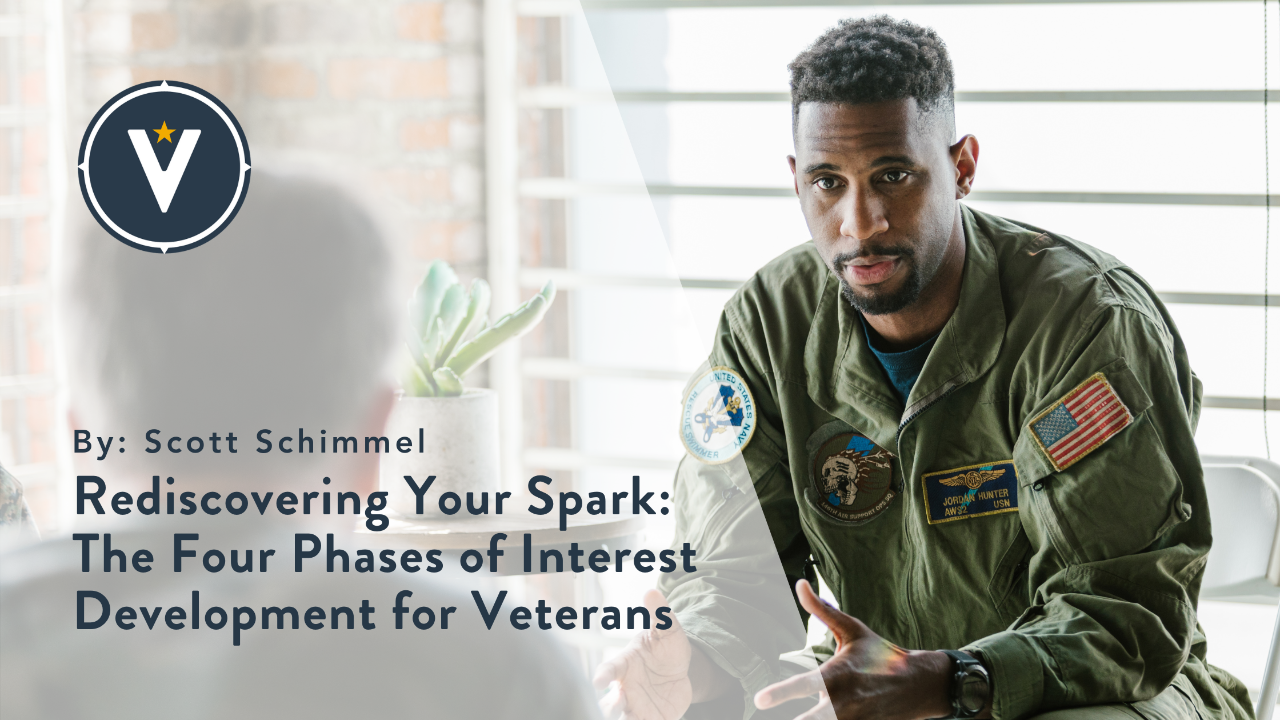Rediscovering Your Spark: The Four Phases of Interest Development for Veterans
Nov 08, 2023
Rediscovering Your Spark: The Four Phases of Interest Development for Veterans
As you hang up your uniform and step into civilian shoes, you're transitioning into a journey that's less about following a specific, prescribed path (like following orders), and more about blazing your own trail. In other words, it’s all about you. It's time to shift gears from being a loyal soldier to following your curiosity. Ann Renninger's research on interest development is a roadmap for this new terrain. Let's explore how her four-phase model can light the way as you discover what makes you tick outside the military.
Phase 1: Triggered Situational Interest
Remember the first time you felt a spark of interest in something new? Maybe it was a hobby, a subject, or a place. That's what Renninger calls "Triggered Situational Interest" (Renninger, 2000). It's like when you stumble upon a new cuisine and think, "Hey, this is pretty good!" It's spontaneous and often ignited by something specific. As a veteran, these sparks might come from unexpected places— a class, a volunteer opportunity, or a random article.
Phase 2: Maintained Situational Interest
If that new cuisine gets you coming back for more, you're entering the "Maintained Situational Interest" phase. You're not just trying it on a whim now; you're genuinely interested. In the military, you might not have had the chance to explore what you liked. Now, you can. Dive into that coding course, start that fitness regimen, or read more into history. This phase is about giving that initial spark a little more fuel (Renninger & Hidi, 2011).
Phase 3: Emerging Individual Interest
As you keep at it, something cool happens. That interest starts to stick. You're moving into "Emerging Individual Interest." It's no longer about external triggers; it's about you. You find yourself watching documentaries on coding, subscribing to fitness channels, or visiting historical sites. You're building knowledge and skills, and it's becoming a part of who you are (Renninger & Hidi, 2016).
Phase 4: Well-Developed Individual Interest
Now, we're at the crux of it all— "Well-Developed Individual Interest." This is where an interest isn't just a pastime; it's a passion. It's got staying power. You're not just coding for fun; you're building apps. Your fitness isn't just a routine; it's a lifestyle. History isn't just stories; it's lessons that shape your worldview. This is the interest that can drive your career choices, your hobbies, and your conversations (Renninger, 2009).
Why This Matters to You
In the service, your role was clear, but your personal interests might have taken a backseat. Now, those interests are your compass. They can guide you to a career that doesn't just pay the bills but also sparks your passion. They can lead you to communities of like-minded folks. And they're the fuel that'll keep you motivated on this new path.
Finding Your Path
So, how do you start? Pay attention to what catches your eye. Give yourself the freedom to explore without judgment. And when you find something that resonates, lean into it. Remember, it's not about finding the "perfect" interest right away. It's about allowing yourself the space to grow and evolve.
Conclusion
Your transition is more than just a career change; it's a chance to rediscover what you love. It's about taking the discipline, dedication, and resilience you've honed in the military and channeling it into pursuits that light you up. So, go ahead—start exploring, learning, and growing. Your next mission is to find what brings you joy and purpose.
References:
-
Renninger, K. A. (2000). Individual interest and its implications for understanding intrinsic motivation. In C. Sansone & J. M. Harackiewicz (Eds.), Intrinsic and extrinsic motivation: The search for optimal motivation and performance (pp. 373-404). Academic Press.
-
Renninger, K. A., & Hidi, S. (2011). Revisiting the conceptualization, measurement, and generation of interest. Educational Psychologist, 46(3), 168-184.
-
Renninger, K. A., & Hidi, S. (2016). The power of interest for motivation and engagement. Routledge.
-
Renninger, K. A. (2009). Interest and identity development in instruction: An inductive model. Educational Psychologist, 44(2), 105-118.
How clear are you about your future?
Download a FREE Clear Future Checklist Now!



